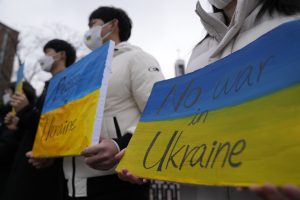On February 24, the first images of Russia’s unprovoked invasion of Ukraine began to traverse the world, striking up international sympathy. Much of the world denounced the war crimes committed by Vladimir Putin and enforced sanctions on the Kremlin. Koreans, too, were outraged by the atrocities committed by Putin, empathizing with the plights of Ukrainian refugees.
But Moscow’s invasion of Ukraine also sparked controversy closer to home. Many Koreans were incensed by the controversial remarks of politicians – including the two leading candidates in next week’s presidential election – regarding the war in Ukraine.
During the presidential debate held on February 25, Lee Jae-myung, the candidate from the ruling Democratic Party, put his foot in his mouth. He claimed that Volodymyr Zelenskyy, “who lacked knowledge in politics and diplomacy, provoked Russia. The Ukraine president is responsible for the outbreak of war.”
Online posts condemning Lee’s crass comments quickly circulated on Reddit. Most users rebuked him.
Alas, Lee was not the only South Korean politician who made provocative remarks on the war in Ukraine. Choo Mi-ae, the former minister of justice, asserted that “the former comedian’s [Zelenskyy’s] foolish attitude towards Russia is the culprit of the war. He provoked the Kremlin’s invasion of Ukraine.”
Lee and Choo also claimed that the war in Ukraine proves that their position on national security, which include abandoning an arms build-up and pursuing peace talks with North Korea, are the only answer.
After facing fierce criticism against their comments about the war, Lee offered an apology for his careless comments. Many voters, however, questioned whether his apology was sincere or a thinly veiled attempt to prevent the loss of votes ahead of the presidential election.
While citizens slammed Lee for his remarks, Yoon Suk-yeol, the presidential candidate from the opposite People Power Party, blasted Lee for defaming the president of Ukraine, offering an apology for Lee’s remarks about Ukraine as a candidate of the presidential election in Korea.
But Yoon’s social media posts suggested that his apology was also just a ploy to prevent the loss of votes. On February 24, when Russia invaded Ukraine, Yoon cited the war in Ukraine as evidence that Lee’s views on national security, particularly his policies toward Pyongyang, are wrong.
On Facebook, Yoon blamed Ukraine’s failure to join NATO for the outbreak of war. South Korea’s ironclad alliance with the United States, he added, is the only answer for the security of the Korean Peninsula and preventing the outbreak of war between two Koreas. Yoon took advantage of the war in Ukraine to suggest that Korea, which is still technically at war, risks suffering the horrors of war once again – unless Yoon is elected president, of course.
Then, on March 1, Yoon’s official Twitter account posted a message that Korea stands with Ukraine. But the Twitter post was severely criticized for including a photo of a tangerine upon which someone had drawn a cartoon-character-like face. Many citizens and some foreign journalists decried the conservative presidential candidate for ridiculing the war.
On March 3, Lee and Yoon apologized for their blunders by having a meeting with Dmytro Ponomarenko, the ambassador of Ukraine in Seoul.
But that will not make voters forget that both men politicized the tragic war for their own political gain, being keen to win voters by demonizing each other. Particularly, both attempted to leverage the war to win support for their own national security policies.
In the 1950s, Korea was severely damaged by the Korean War, in which millions of people lost their lives. The fratricidal war taught Koreans firsthand that war is a humanitarian crisis that takes decades to recover from. Nothing can justify war. But it seemed the two leading presidential candidates did not learn from the Korean War the basic lesson of empathy for others suffering in a similar conflict.

































